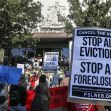COVID-19 is causing massive unemployment. Unemployment often makes it impossible for tenants to pay their rent. Landlords evict. Tenants became homeless, often threatening public health and safety. To avoid this downward spiral, both Presidents Trump and Biden issued moratoriums on tenant evictions. But a federal judge in Texas blocked the current eviction ban by questioning its constitutionality. Two days later, the Department of Justice (DOJ) announced its appeal.
“Although the COVID-19 pandemic persists,” said U.S. District Judge J. Campbell Barker for the Eastern District of Texas on February 25, “so does the Constitution.”
Judge Barker put the competing interests on his scale of justice, and the federal government lost, finding the Centers for Disease Control (CDC), the agency that had issued the eviction ban, had no authority to do so. If his ruling stands, property owners in Texas will now be allowed to evict tenants and will face no criminal charges for doing so.
The federal government first issued a 120-day prohibition on eviction as part of the “Coronavirus Aid, Relief, and Economic Security (CARES) Act” in March 2020. The ban was not renewed and expired on July 27. The CDC stepped in and issued “The Temporary Halt in Residential Evictions to Prevent the Further Spread of COVID-19,” in September. This act was set to expire on December 31. Federal legislation then extended it to January 31, 2021, and an additional order, signed by President Biden, extended it to March 31.
To qualify for the protections of the challenged order, single tenants must declare to their landlords that they have met five conditions: (1) they have made best efforts to obtain government assistance; (2) they fall below incomes of $99,000 for single tenants and $198,000 for couples; (3) they are unable to pay rent due to “substantial loss of household income” or “extraordinary out-of-pocket medical expenses; (4) they will use “best efforts” to make partial payments and; (5) they have no place else to go and are likely to become homeless if they are evicted.
Landlords and corporations who violate the prohibition are subject to criminal penalties of up to one year of imprisonment and an additional year of supervised release.
Plaintiffs in the case are Lauren Terkel et. al., a group of managers and residential property owners in Texas represented by the Texas Public Policy Foundation and the Southeastern Legal Foundation. They argued that Article I of the Constitution does not give the federal government the authority to order property owners not to evict tenants, therefore giving this power to the states. The federal government argues that a national eviction moratorium is within the power granted by Article I because it has the authority to regulate commerce.
Judge Barker made it clear that this lawsuit does not govern state police power, such as that exercised during the Great Depression when states enacted foreclosure moratoriums. He limited his opinion solely to federal powers to evict and stressed the uniqueness of its exercise. He also pointed out that several states had created eviction moratoriums of their own, and he cited the legality and jurisdiction of states to do so.
“The federal government cannot say that it has ever before invoked its power over interstate commerce to impose a residential eviction moratorium,” he wrote, citing its inaction during the “deadly Spanish flu pandemic” and the Great Depression. “The federal government has not claimed such a power at any point during our Nation’s history until last year.” He also wrote, “Here, no historical practice of analogous federal regulation has been cited.”
Judge Barker further rebuked the moratorium for being overbroad because it was not limited to the COVID-19 crisis. He said he feared more widespread use, such as suspending evictions for spouses of prisoners.
The Judge’s opinion then gave a detailed analysis of Article I of the Constitution, specifically the “Commerce Clause,” which allows regulation of only three categories of activity. The relevant one in this case is “those activities having a substantial relation to interstate commerce.” Most precedents for use of this category relate to “production of use of commodities.” Here, the judge found that “real estate is inherently local” and since “residential buildings do not move across state lines…an eviction is fundamentally the vindication of the property owner’s possessory interest.”
In addition, since the CDC’s order does not change the financial obligations of the parties, it cannot be classified as economic in nature at all, a criterion necessary for Commerce Clause qualification. The judge also addressed the health and safety aspects of the order, stating, “Although public health and safety are important goals on which the government may act pursuant to its commerce power, neither alone makes a law economic in character.”
The judge’s opinion further pointed out the overbreadth of the CDC rule because it does not address the public health implications of evicting people who are not dangers to public health because they have been vaccinated. Nor does it discuss the need to consider whether evicted persons might spread the virus if they move to another state. Rather, it bans evictions of all tenants who meet the five-point criteria.
Barker added, “And although a person’s residence in a property may have a commercial origin, that alone is not enough to make the regulated activity itself economic in character.” In his concluding paragraphs, he cited Justice Kennedy’s opinion in Lopez v. U.S. when he said, “In a sense any conduct in this interdependent world of ours has an ultimate commercial origin or consequence, but we have not yet said the commerce power may reach so far.”
The judge then granted summary judgment to the landlord/plaintiffs, stressing that the “authority to order property owners not to evict specified tenants rests with any given state.” He chose not to issue an injunction because he believed that the defendants would respect his declaratory judgment.
The ruling was celebrated by Robert Henneke, General Counsel of the Texas Public Policy Foundation, who was quoted in Bloomberg News, saying, “The CDC attempted to use Covid-19 as an opportunity to grab power and the court rightfully corrected this egregious overreach.”
The DOJ filed a notice of appeal on February 27. Brian M. Boynton, Acting Assistant Attorney General for the Justice Department's Civil Division, released a statement saying DOJ “respectfully disagrees” with Judge Barker’s decision. He said the CDC’s eviction moratorium does not exceed Congress’ powers because it “does not extend beyond the plaintiffs in that case, and it does not prohibit the application of the CDC’s eviction moratorium to other parties.”






